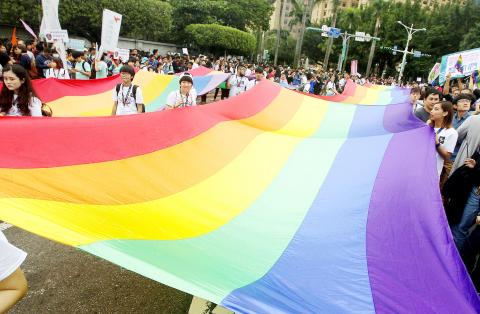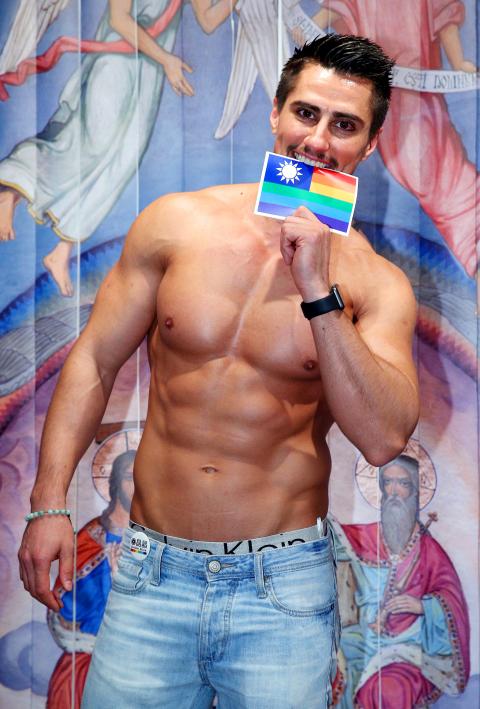Last month, over 80,000 lesbian, gay, bisexual and transgender (LGBT) people and their supporters marched in the 13th Taiwan LGBT Pride Parade (台灣同志遊行). Turnout was historic, as the parade has become the second largest LGBT event in Asia and the Middle East, after the Tel Aviv Gay Pride Parade.
A number of events were also held last month to celebrate LGBT pride, including the Taiwan International Queer Film Festival (台灣國際酷兒影展), the Hand in Hand Asian LGBT Choral Festival, which featured over 150 vocalists from around the world, and the ILGA-Asia Conference, the largest of its kind in Asia with 300 activists from over 30 countries.
In the past, most foreign participants were from neighboring countries. But this year, many hailed from the West. According to the Taiwan LGBT Pride (台灣同志遊行聯盟), organizer of the parade, over 5,000 foreign participants took part in the parade and related international events. And thanks to the foreign media’s coverage, the parade successfully boosted the global visibility of Taiwan’s LGBT community.

Photo: REUTERS
“The Taiwan LGBT Pride Parade is a famous international event. I want to be part of it to show support,” said Father Silas of the Romanian Orthodox Church during his visit to Taipei. Silas posed nude for the Orthodox Calendar this year to protest homophobia and show his support for the LGBT community.
Meanwhile, some presidential and legislative candidates promised to protect LGBT rights should they be elected.
OVERWHELMING SUPPORT

Photo: CNA
On the day of the parade, the Ministry of Justice completed the nation’s largest online vote to date on same-sex marriage, which will serve as a reference for policymaking. More than 310,000 people participated in the three-month vote, which was held between Aug. 3 and Oct. 31 on the government’s Public Policy Network Participation Platform (公共政策網路參與平台).
The poll revealed that 59 percent support legal protection for same-sex couples, 71 percent support a same-sex marriage act and 45 percent support a same-sex partnership act, where gay couples are offered certain rights enjoyed by married couples, instead of full marriage rights.
These figures clearly show that support for same-sex marriage has surged to a new high compared with a 2013 poll.
TIME TO ACT
For that poll, the ministry commissioned the Police Research Association (中華警政研究學會) to conduct a study on the feasibility of same-sex marriage legislation. The results showed that 53.7 percent of respondents agreed that same-sex couples should be allowed to marry, and 61.1 percent said that married same-sex couples should be allowed to adopt children.
In response, the association recommended that the ministry push for marriage equality legislation.
However, when the legislature commenced discussion of the draft bill for marriage equality last year, not only did the ministry ignore the association’s recommendations, it also called same-sex marriage “an ethical violation of human relations” in its report to the legislature.
With the results of this new poll showing support for marriage equality increasing from 53.7 percent to 71 percent within a few years, will the ministry continue to groundlessly criticize it while ignoring public opinion?
Some politicians and officials claim that Taiwanese are not ready for same-sex marriage. But the results of the ministry’s own polls clearly show that the majority of Taiwanese are. It’s about time our politicians faced up to this reality.

On a hillside overlooking Taichung are the remains of a village that never was. Half-formed houses abandoned by investors are slowly succumbing to the elements. Empty, save for the occasional explorer. Taiwan is full of these places. Factories, malls, hospitals, amusement parks, breweries, housing — all facing an unplanned but inevitable obsolescence. Urbex, short for urban exploration, is the practice of exploring and often photographing abandoned and derelict buildings. Many urban explorers choose not to disclose the locations of the sites, as a way of preserving the structures and preventing vandalism or looting. For artist and professor at NTNU and Taipei

March 10 to March 16 Although it failed to become popular, March of the Black Cats (烏貓進行曲) was the first Taiwanese record to have “pop song” printed on the label. Released in March 1929 under Eagle Records, a subsidiary of the Japanese-owned Columbia Records, the Hoklo (commonly known as Taiwanese) lyrics followed the traditional seven characters per verse of Taiwanese opera, but the instrumentation was Western, performed by Eagle’s in-house orchestra. The singer was entertainer Chiu-chan (秋蟾). In fact, a cover of a Xiamen folk song by Chiu-chan released around the same time, Plum Widow Missing Her Husband (雪梅思君), enjoyed more

Last week Elbridge Colby, US President Donald Trump’s nominee for under secretary of defense for policy, a key advisory position, said in his Senate confirmation hearing that Taiwan defense spending should be 10 percent of GDP “at least something in that ballpark, really focused on their defense.” He added: “So we need to properly incentivize them.” Much commentary focused on the 10 percent figure, and rightly so. Colby is not wrong in one respect — Taiwan does need to spend more. But the steady escalation in the proportion of GDP from 3 percent to 5 percent to 10 percent that advocates

From insomniacs to party-goers, doting couples, tired paramedics and Johannesburg’s golden youth, The Pantry, a petrol station doubling as a gourmet deli, has become unmissable on the nightlife scene of South Africa’s biggest city. Open 24 hours a day, the establishment which opened three years ago is a haven for revelers looking for a midnight snack to sober up after the bars and nightclubs close at 2am or 5am. “Believe me, we see it all here,” sighs a cashier. Before the curtains open on Johannesburg’s infamous party scene, the evening gets off to a gentle start. On a Friday at around 6pm,